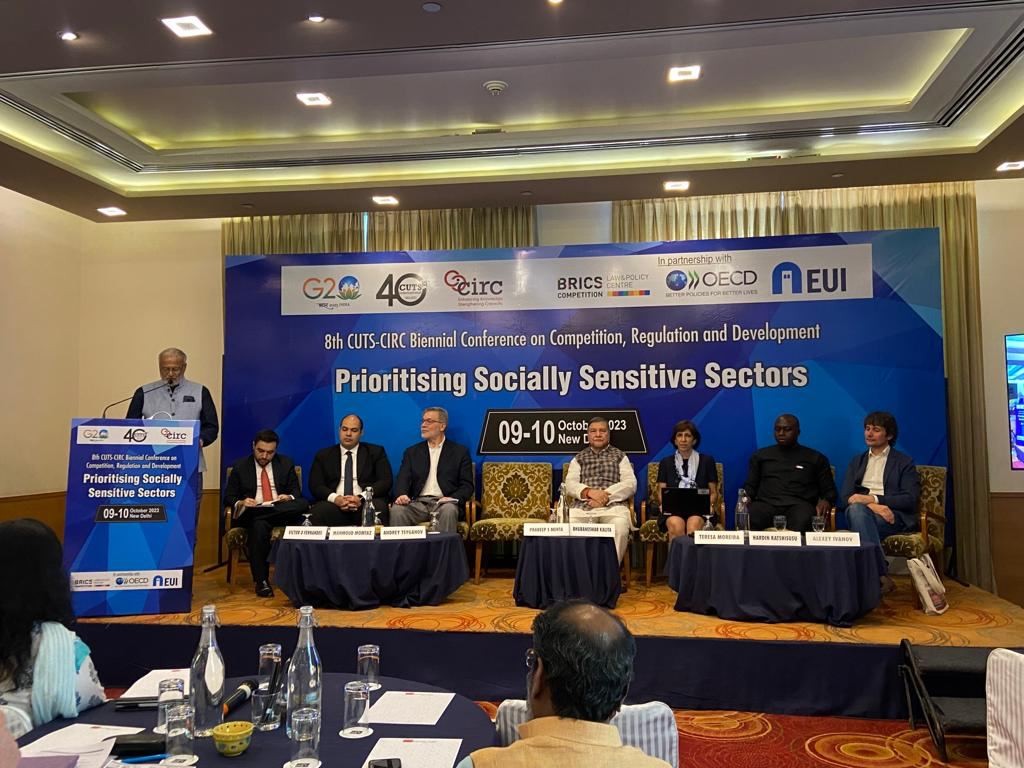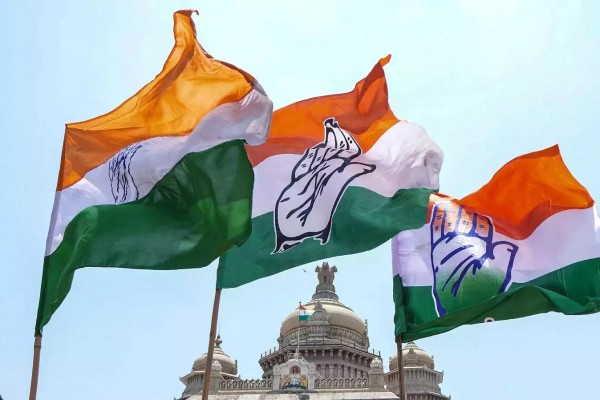On October 9-10, the 8th CUTS-CIRC Biennial Conference on Competition, Regulation and Development was held in New Delhi, India. The theme of this year's event: "Prioritising Socially Sensitive Sectors." The conference was organized by the Competition Commission of India (CCI) jointly with the International BRICS Competition Law and Policy Centre, the CUTS International, the CUTS Institute for Regulation & Competition (CIRC), as well as the Organization for Economic Cooperation and Development (OECD) and the European University Institute (EUI).
Convergence of several crises like pandemic, armed conflicts, climate change and the ensuing geopolitical churning are adversely affecting the society, in general, and poorer sects, in particular. The polity and regulators in their endeavours, therefore, ought to prioritise socially sensitive sectors and issues, such as pharmaceuticals & healthcare, food & agriculture, information & communication, education, jobs etc.
The conference participants discussed distortive anticompetitive practices in these sectors and the challenges facing antitrust authorities in the context of the global crisis.
Opening the Inaugural Session, Pradeep S Mehta, Secretary General, CUTS International, pointed out that “сlimate-related disasters have profound implications for the global value chain, leading to broken supply chains, rising inflation, and widening socio-economic inequality within and across countries.”
Teresa Moreira, Head, Competition and Consumer Policy Branch, Division on International Trade and Commodities, UNCTAD, highlighted the organization's efforts to include developing countries in an equal dialogue with the world's leading powers. Today's highly polarized world needs more than ever to promote solidarity and cooperation, she said. The latest declaration of UNCTAD's ministerial conference entitled The Bridgetown Covenant, identified three major global challenges: inequality, climate change and the uneven speed of digital transformation. Global trade was closely linked to those issues and had its own challenges. The only way to solve all these problems is to unite the efforts of different countries, Teresa Moreira stressed.
Willard Mwemba, Director and Chief Executive Officer, COMESA Competition Commission, was concerned about the rising food price, disruptions in the supply chain, market distorting import-export policies and climate crisis adding to the food insecurity.
“COMESA Competition Authority is reviewing policies to ensure that climate change and environmental implications are considered in the public interest,”
he added.
The importance of CUTS International as India's oldest non-governmental organization, which helps the most disadvantaged get access to education, food and development opportunities, was noted by Andrey Tsyganov, Deputy Head of FAS Russia.
"The debate on these issues in India is important also because CUTS represents the voice of developing countries, the voice of the Global South and millions of consumers,"
Tsyganov said.
The antitrust discourse is still dominated by the consumer welfare paradigm developed by the Chicago School in the 1980s, which no longer meets the realities of the modern world, said Alexey Ivanov, Director of the International BRICS Competition Law and Policy Centre. This happens, among other things, because the space for developing countries to speak out in the global marketplace of ideas is limited. Nevertheless, today such institutions as UNCTAD, BRICS, CUTS International have an opportunity to get rid of the imposed "Chicago consensus" and develop their own vision of the system of market regulation and solution of social problems. In particular, it is necessary to incorporate sustainable development goals into the system of antitrust legislation. This will help to ensure decent living conditions for the people of the Global South.
"It is crucial to create a new type of consensus where the common good really matters. It’s time for antitrust. It should become a tool for solving social problems, not just a way to achieve economic efficiency,"
Ivanov emphasized.
Willard Mwemba, Director and Chief Executive Officer, COMESA Competition Commission, was concerned about the rising food price, disruptions in the supply chain, market distorting import-export policies and climate crisis adding to the food insecurity.
“COMESA Competition Authority is reviewing policies to ensure that climate change and environmental implications are considered in the public interest,”
he added.
Simeon Konan Koffi, Executive Director, ECOWAS Regional Competition Authority, outlined the challenges that are slowing down the economic development of countries on the African continent. These included inflated food prices, the effects of the COVID-19 pandemic, political conflicts, climate risks, and increased terrorist activity in Africa.
The causes of terrorism stem from many unresolved social issues, among others, said Mahmoud Momtaz, Сhairman of the Egyptian Competition Authority (ECA). Poverty, lack of medical care and education are usually behind the phenomenon.
"From an economic point of view, this is an area where competition law can be used as a tool of stabilization and resolution of political problems among others."
The polycrisis is making us rethink our competition law rules to make it more inclusive. Víctor Oliveira Fernandes, Commissioner, CADE, Brazil, noted that the regulator's task is to address the financial instability and unemployment that Brazil has been struggling with since the 1990s. He also outlined the new challenges CADE faces: how to incorporate social dimension into competition policy; how to analyze sustainability agreements in the new economy; and how to make digital markets more inclusive.
Competition law can and should contribute to solving social problems, but to do so it is time for it to move beyond the consumer welfare paradigm, said Hardin Ratshisusu, Deputy Commissioner, Competition Commission of South Africa. Noting the need to integrate the SDGs into competition law, he quoted UN Secretary-General António Guterres:
“The SDGs aren’t just a list of goals. They carry the hopes, dreams, rights and expectations of people everywhere. Yet today, only 15 per cent of the targets are on track. Many are going in reverse. Instead of leaving no one behind, we risk leaving the SDGs behind.”
The conference is witnessing the participation of eminent experts from the United Nations, International Labour Organization (ILO), OECD, competition authorities from Egypt, South Africa, and other African regions such as COMESA, ECOWAS, Fiji, Russia, Brazil and Uzbekistan. The conference is also being attended by academics, policy researchers, lawyers, economists from across the world.




